Originally posted at Dispatches from Reality, by Scipio Eruditus. dfreality.substack.com
“Arms and HEROES I sing! The might of the Turks.
Him who was willing to undergo Suleiman’s wrath—
That same Suleiman’s mighty arm,
He at whose saber Europe trembled.
— The Siege of Sziget, Nikola VII Zrinski Zrínyi Miklós
What makes a man fight on when no hope is left?
What turns him into a lion when cornered, selling his life dearly; all so that his brothers may yet live?
What spurs a man onward, knowing death is certain; knowing his doom lays before him, and yet, he rides out all the same?
Battles such as Thermopylae, Masada, and Antioch; Tenochtitlan to Gandamak; Little Bighorn to the Alamo; all perfectly capture the essence of the last stand – a battle against all odds. All provide us timeless lessons, and not just on battlefield tactics and military history. Last stands provide a sobering and yet critical look into the heart of a warrior: a look at the caliber of men — fighting for causes both righteous and unrighteous — who carved out their places in history with bronze, iron, and blood. Today we will explore one of the most underappreciated battles in this category: The Siege of Szigetvár, or as Cardinal Richelieu stated, “the battle that saved civilization.”
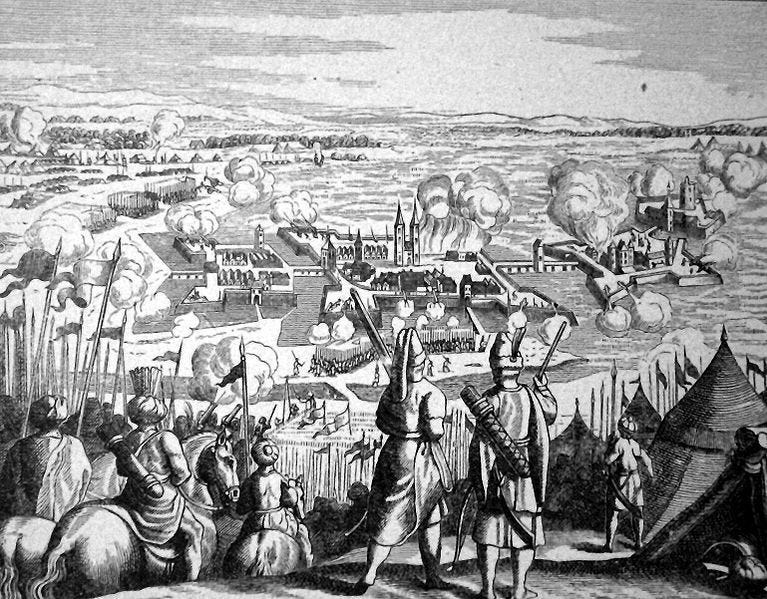
Since its earliest days, Islam has almost exclusively spread its barbarous ideology through the sword. As such, Muslim armies and military invasions were a constant threat against Christendom for over a millennia. Eastern Europe in particular has faced the brunt of this historical assault due to its geographical proximity to Muslim controlled territories, with the 14th through 17th centuries serving as the high water mark of Islamic invasions into Europe. While these attacks on the body of Christ take a different form today — such as the perennial Muslim riots in France, or the Islamic rape gangs of Britain — the threat remains all the same.
Amongst Islam’s most cunning generals was Suleiman the Magnificent, the longest serving and most influential of the Ottoman Empire’s many sultans. For his last campaign, the Ottoman sultan had the fortress of Eger in his sights: the place of his embarrassing defeat 14 years earlier. In 1566 he now led one of the largest armies ever assembled under his command. Modern estimates place the strength of his forces at over a 100,000 Turkish troops, with 20,000 Tatar soldiers also at his disposal; contemporary historical sources state his troop count at over 300,000. While I will be using the more conservative estimates for this essay, it is quite possible that the forces arrayed against Szigetvár were even more lopsided than modern historians believe.
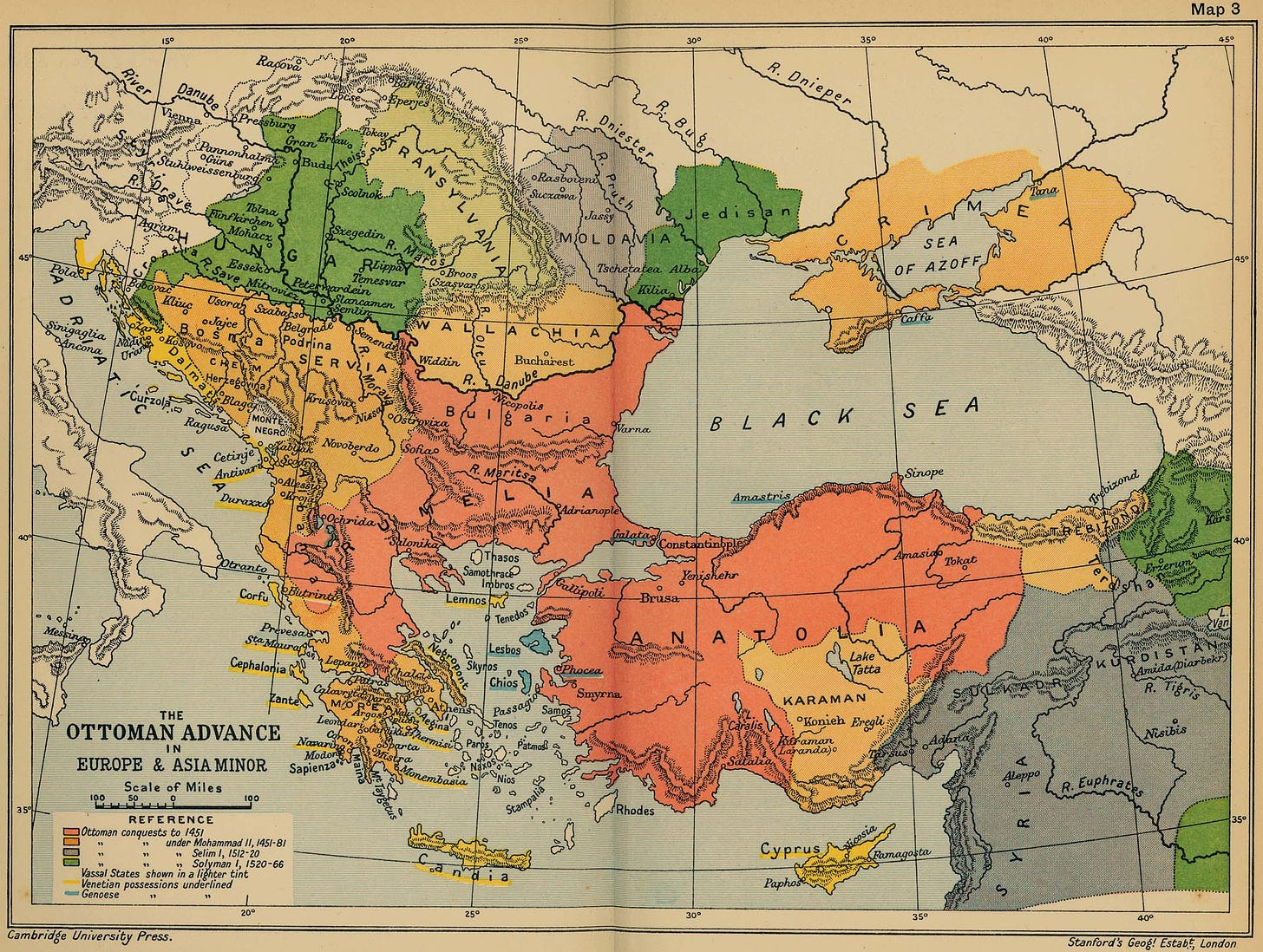
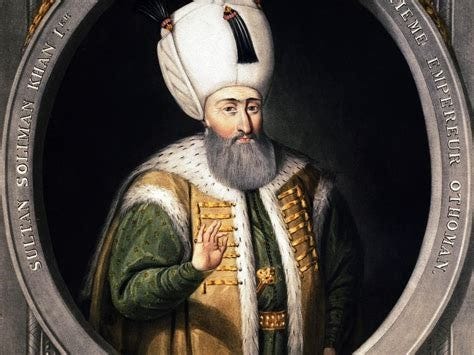
Standing athwart this seemingly unstoppable foe was Miklós IV Zrínyi: Viceroy (Ban) of Croatia and commander of the garrison stationed at Szigetvár. The ban had made a name for himself during the first Siege of Vienna in 1529, at the ripe age of just 21. He continued to distinguish himself as a shrewd and ruthless military commander throughout his life, seeing extensive combat at the Siege of Pest, the Battle of Babócsa, and the Battle of Moslavina. For the next 37 years, Zrínyi and his family zealously lead Croatian & Hungarian forces against the ever encroaching Ottoman Empire.
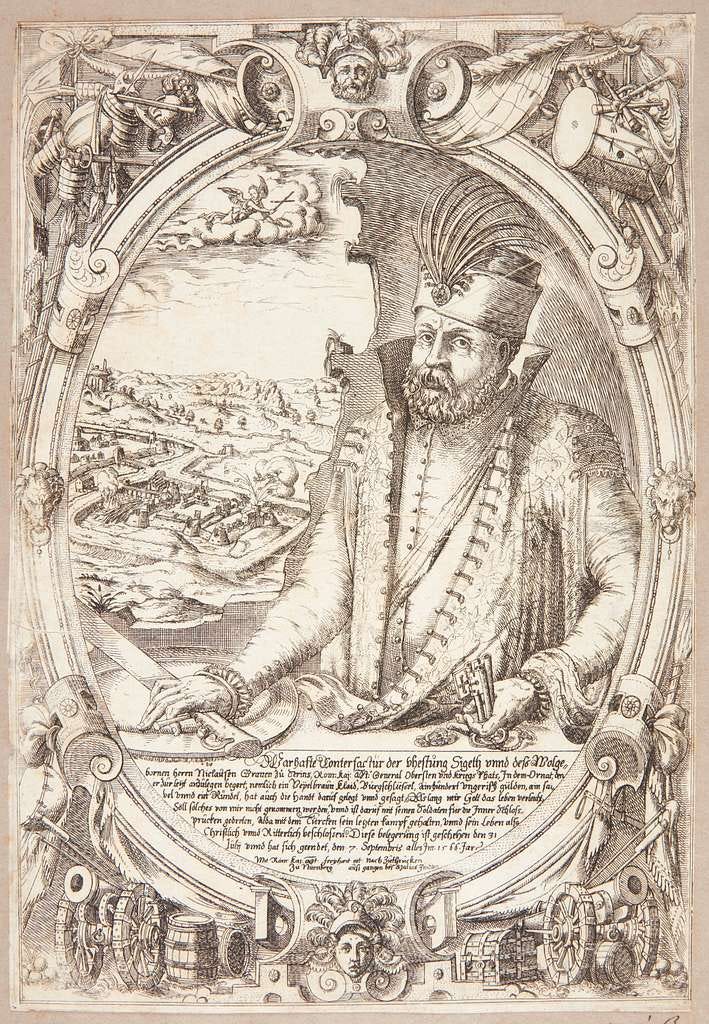
Suleiman’s army began its march north towards Eger in the Summer of 1566. While Ottoman forces set forth on their latest jihad, Zrínyi led a devastating and effective raid upon the Ottoman baggage train at Siklós. The Ottoman commander and high ranking officers were executed to a man, no doubt an intentional provocation on Zrínyi’s part in order to draw the ire of Suleiman. From Szigetvár, the viceroy could threaten the length of Ottoman resupply lines with impunity. Zrínyi’s crushing victory over Ottoman forces at Siklós demanded a response from the Sultan. Such attacks would seriously hamper Suleiman’s intended goals, ultimately spelling the doom of his latest campaign if left unattended. Angered at the death of his close friend, Sultan Suleiman set forth to lay siege to the fortress-city of Sziget.
“Ayağını yorganına göre uzat.
Stretch your arm NO FURTHER than your sleeve will reach.
— Turkish Proverb
The 100,000 strong Mohammedan army began their trek back towards Szigetvár, intent upon removing this thorn in their side. Turkic advanced raiding parties suffered several defeats against cavalry sorties launched from Sziget, but the approaching tendrils of Suleiman’s army made clear the fate of Zrínyi’s castle. The Viceroy received news of the impending arrival of the Ottoman army from his scouts, and he readied his city for a siege.
Zrínyi called his son, Gyorgy, to his office, placing a recently finished letter in his hands. The Lord of Sziget then imparted these final words to his child:
“My son, I now see you for the last time,
And for that too I bless my God,
That he allowed you to hear my final speech;
Hear, my son, I ask, my exhortation.Here, in nobility I leave you,
With sword I have expanded your worth;
You will have everything; learn godly fear,
God will increase your fortune.Learn from me, too, hardened chivalry,
Learn exhaustion and faithfulness to your homeland,
Learn from me good-natured action,
But from others, learn fortune and its fruits.I have lived long enough already, seen evil and good,
And have now tired of meaninglessness:
For I have seen always, what the world gives
With one hand, with two it immediately jerks back.I have not seen any good, in which I could rest,
I have not seen any rest, in which I could be confident;
Only in you, Jehovah, when I served,
Did I then find contentment and rest.My son, serve him, and walk on that path,
Which God’s Son ordered upon this world
This gives you strength over that pagan Turk,
This gives you good fortune upon this earth.And then remember my many trials,
Be not a bastard dove born of a fierce falcon,
Carve your fame with your sword amongst the pagans,
Let them say, that you were truly descended from Zrínyi.I praise God in the heavens for you,
That He may always increase your strength;
May He grant that you would always serve His wishes,
And that in much time, in heaven you may see me.This my letter take quickly to the king,
So that he in time may prepare for war,
And to attend well to the country’s affairs,
For Suleiman is hurrying quickly toward his castle…The spirit belongs not to us, but God,
Will you try to wrestle over your desires with Him?
Save, my son, yourself for a greater purpose,
And for our poor ruined homeland’s better days.It must be so, that I finish here my days,
Because God has ordered here my last hour,
Now, finally, I must show what I am made of;
Follow, when you must, my great trial.”— The Siege of Sziget
Zrínyi’s son carried his father’s letter to the king; his patriarch’s last words were etched onto his heart. Father and son say their final goodbyes before Gyorgy takes the fastest horse he can find, racing out of the fortress; The elder Zrínyi watched his son ride off into the distance, before returning to preparations for his final and greatest challenge. The Turkish horde’s dust clouds are already visible on the horizon.
On August 5th, Sultan Suleiman and his 120,000 strong Islamic horde finally encamp around the town of Sziget. We see here at Szigetvár a vital tactic for any successful commander to recognize and internalize: terrain determines the flow of battle. The terrain has been carefully selected to nullify the enemy’s greatest strength: their numbers. The unusual layout of the fortress-city of Sziget would provide a significant challenge for Turkish forces to overcome. Narrow bridges were designed to funnel enemy forces onto them; swampy terrain made cavalry useless; high battlements encircled by deep moats made scaling its walls a daunting task. This carefully engineered killing ground would ensure that every inch gained would come at a ghastly cost for the attackers.
No avenue of escape remains for Zrínyi and his forces — not that they desire one. To flee now is to consign their countrymen and families to even greater depravities at the hands of the Turks.
They will stop the Ottoman hordes here, at Sziget; or they will die in the attempt, taking as many Mohammedan curs along with them as they can.
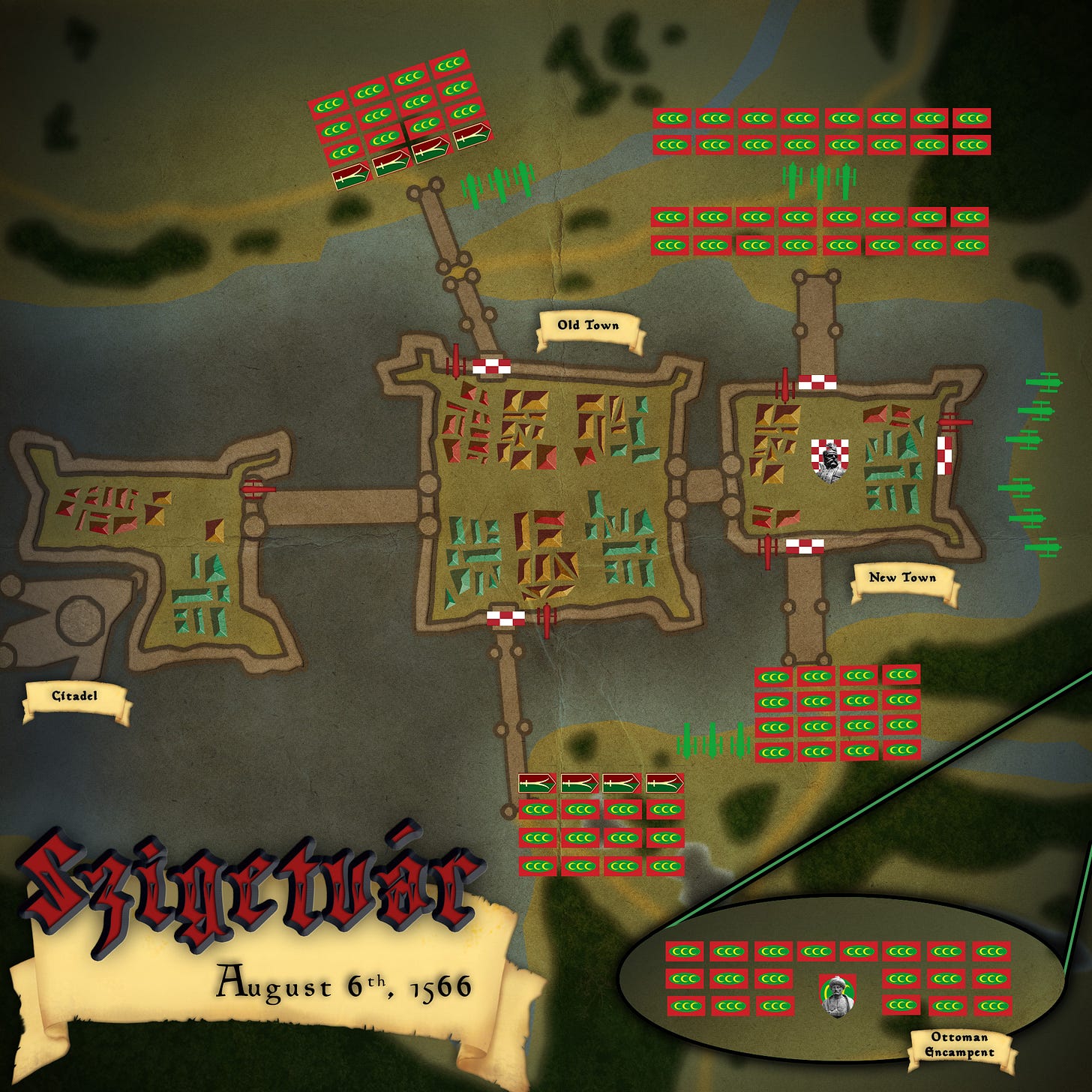
On the morning of August 6th, Zrínyi ordered the firing of a single cannon into the Turkish lines: a small taste of what the ban had in store for the Emperor’s forces. With that, the Siege of Szigetvár had begun in earnest. The thundering Turkic battle cry would have been deafening: tens of thousands, perhaps hundreds of thousands of Mohammedan warriors unleashing their ear piercing ululations as they charged into the teeth of the Croat defenses. With the battle cry and battle drums of their implacable foes filling their ears, smoke, blood, & death would soon fill their nostrils.
The artificial lake surrounding the fortress-city provided a moat that impeded cavalry and all but the most determined of men. While difficult to navigate, the hot summer months had dried the lake out, leaving it much shallower than normal. Throughout the siege, Turkish forces will use dirt, detritus, and corpses to fill in this moat in order to open new avenues of attack upon Szigetvár’s walls. The stench of death and viscera clogs the air, and the crows feast greedily upon the remains of defender and attacker alike.
For the first several days of the siege, the defenders of Sziget admirably held off the Muslim army at their gates. Cannon fire and artillery barrages continually pound both sides, enveloping the field in a constant haze of sulfur, smoke, and dust. The unseasonable summer heat had yet to dissipate, and the swampy environs of the town surely added to the hellacious conditions the combatants suffered in. Over the next three days, roughly 3000 Ottoman soldiers would perish in the grinding and slow going siege warfare.
On August 9th, the Ottoman forces finally break through the gates of New Town. Ottoman cavalry see their first action in the battle, cutting down the Croat & Hungarian defenders. Ban Zrínyi is mounted on horseback, fighting like Mars personified: he personally engages in the rearguard action as the defenders of Sziget are forced to fall back to the more defensible section of the fortress-city. The worst losses of the siege so far are suffered this day; the bodies of 300 Croats are defiled as night sets in and Turkish forces pour into the first section of the fortress.
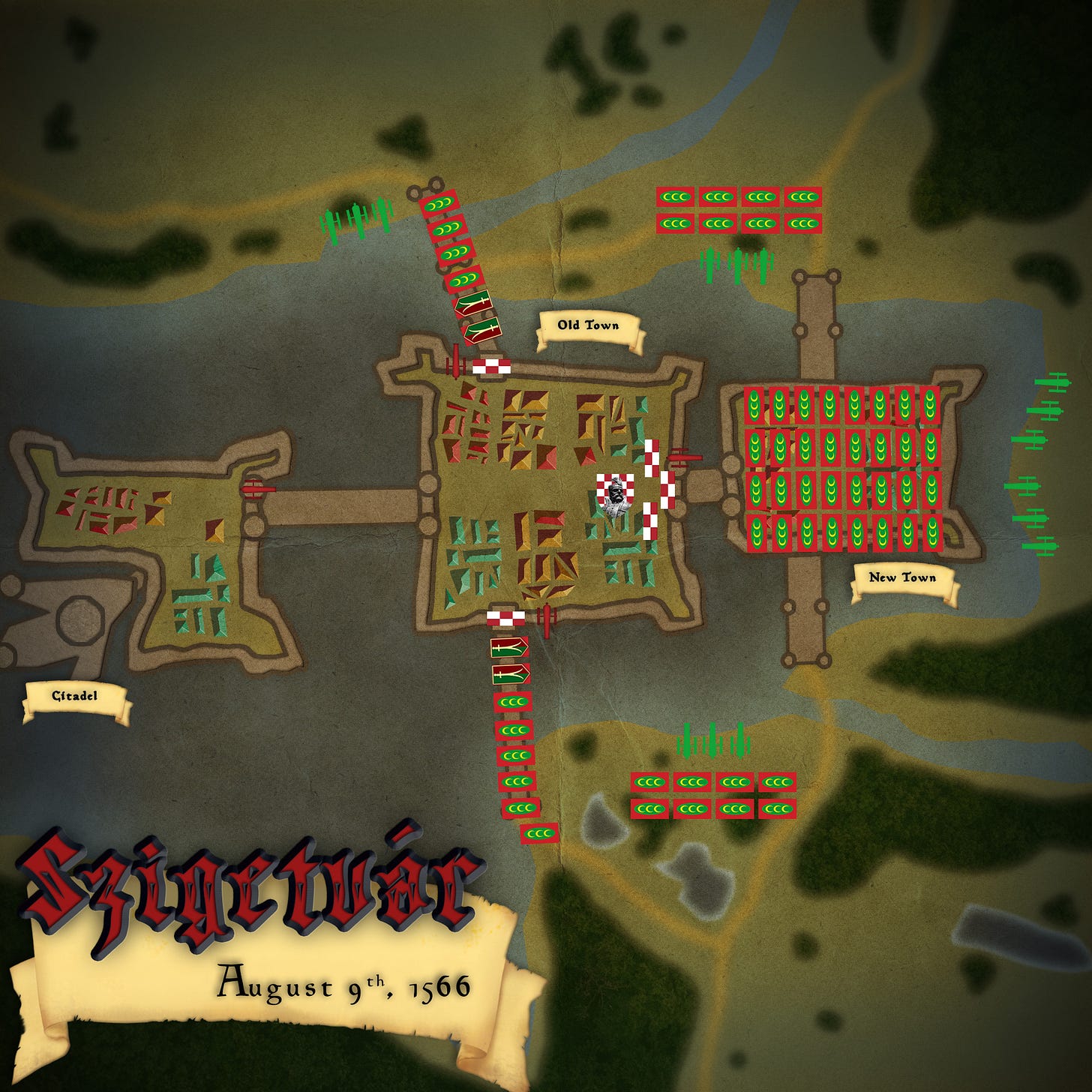
“FOOLISH is he who believes the Turk’s oath,
Especially if he entrusts his life to the Turks.
A Turk considers it a sin to hold to his word,
Especially if it is given to a Christian.”
— The Siege of Sziget, Nikola VII Zrinski Zrínyi Miklós
For the next ten days, Zrínyi and his forces are engaged in unceasing close combat. Killing another man is hard work; a physically and morally exhausting task. The roughly 2,700 defenders are sleeping a few hours a night, if that, and sleep exhaustion would inevitably be taking its toll on every man. Even the rote thrust of a spear into a body, a slash of the sword, the firing of a cannon, or the loading of a gun, has become a monotonous and repetitive action to the defenders of Sziget. As the days toil on, thousands more Turks and Tatars lay dying on the fields of Croatia. Szigetvár has proven to be an exceedingly difficult jewel for the Sultan to add to his crown. The lord of Sziget has made the Turk pay dearly for every inch of ground gained.
On August 19th, Janissary shock troops, the crack infantry divisions of Ottoman forces, breach the ramparts of Old Town. The defenders are nearly routed before they can fall back into the citadel; Zrínyi once again cuts down the Turkic forces as they attempt to envelop his ever dwindling troops. At this point nearly half of the defenders have fallen, leaving roughly 1,700 Croat & Hungarian defenders holed up within the grounds of the citadel. Many of these men were simple farmers and peasants, and yet they held off the seasoned Ottoman army with the tenacity of a veteran campaigner.
After the breach, Ottoman artillery mercifully cease their near constant bombardment. As dusk approaches, a silver tongued representative of Suleiman reads the sultan’s offer aloud to the ragged defenders of Sziget. Zrínyi and his men would be allowed to live, and even more, Suleiman was willing to grant lordship of Croatia to the viceroy. All he must do is bend the knee, turn over his castle to the Ottomans, and open his gates. While Suleiman’s offer falls on deaf ears, Zrínyi attempts to send one last message for reinforcements. His couriers are caught and killed before they can break free from the Turkic encirclement.
The last hope of Sziget’s defenders is snuffed out: for them, this will be a fight to the death.
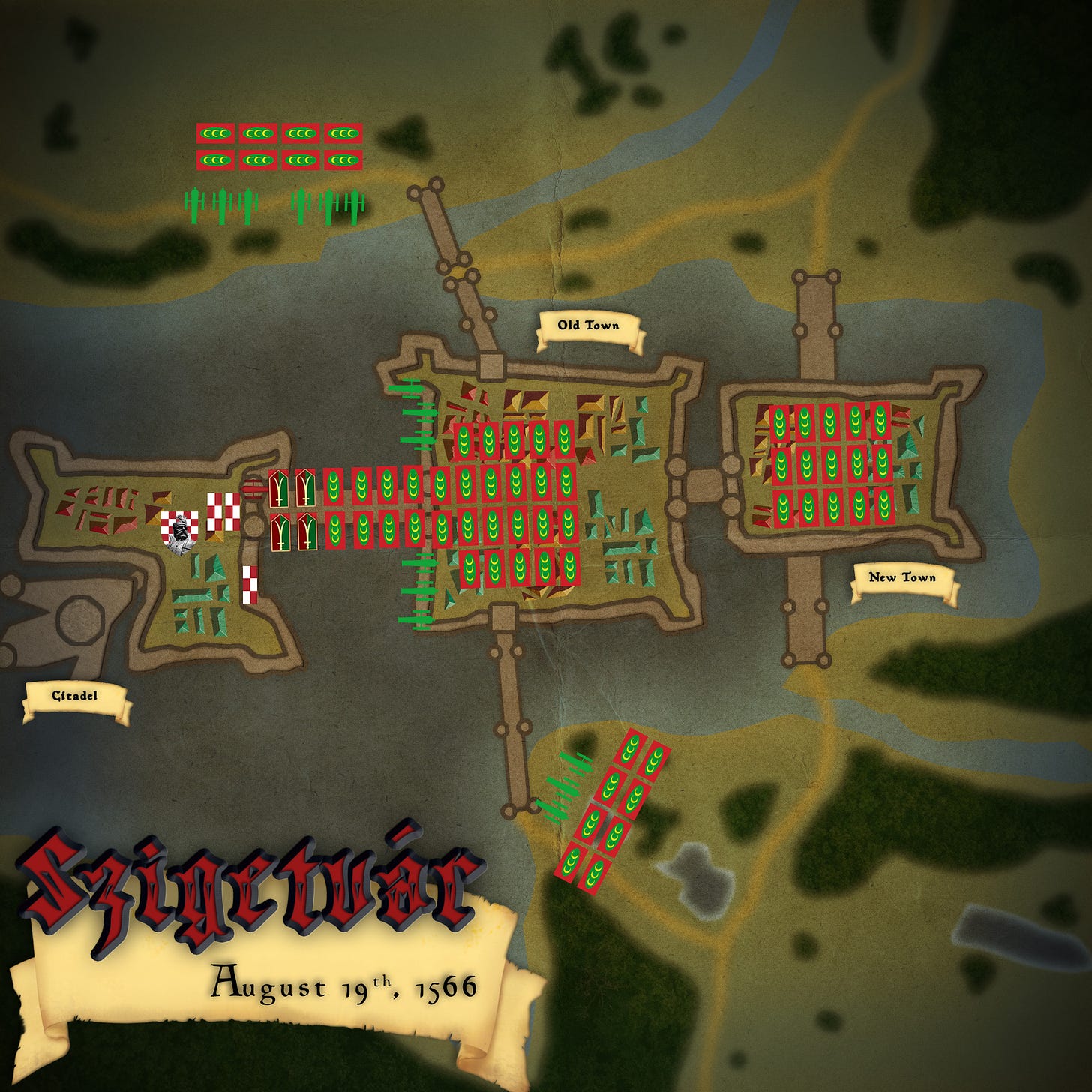
On Aug 20th, the siege of the citadel resumes alongside the punishing Ottoman cannonades. Arrows with propaganda leaflets attached are fired at the defenders, both killing the Croat soldiers as well as waging psychological warfare upon the beleaguered inhabitants of Sziget. The hollow Turkish promises of safety, if only the defenders surrender, is a gambit that no seasoned commander would fall for. The Turk has butchered many a naïve Christian soldier with this same empty promise. Zrínyi has sworn to defend Szigetvár to the last, and the Ottoman army will pay for every inch of Croatian soil in gallons of Islamic blood. On August 29th, the Janissaries fail to breach the citadel in a disastrous attack upon the main gates.
The Ottoman infantry sorties now begin to dwindle in intensity, before altogether ceasing on September 1st. The Turks remain encamped within New Town and Old Town while their sappers dig tunnels for the next several days underneath the walls of Sziget’s citadel. Hundreds of pounds of gunpowder and dynamite are staged under critical junctures in the citadel walls. On September 5th the explosive charges are detonated, setting the castle grounds ablaze and causing massive sections of the walls to cave in on the defenders. Hundreds of Zrínyi’s soldiers will perish in the blast and the subsequent infernos.
While waiting for the inevitable attack upon their now burning fortress on September 6th, no such attack is forth coming. The stress and conditions of a prolonged siege had finally taken its inevitable toll upon the aging sultan’s health. Unbeknownst to the defenders of Szigetvár — or the bulk of the Ottoman army for that matter — Suleiman the Magnificent had died some time during the night of September 5th. High ranking officers and government officials therefore conspired to keep this fact hidden from the army as a whole, lest general chaos break out and their troops flee the field of battle. The sultan’s personal physician was strangled to death in order to ensure this volatile situation was kept under wraps.
“So mercilessly does a lion leave its lair,
And so dreadfully does a comet shine on high:
It does not turn to great nations without destruction,
Horrific fates it carries by its power.
— The Siege of Sziget, Nikola VII Zrinski Zrínyi Miklós
For the defenders of Szigetvár, the encroaching fires would force them to abandon the castle by the morning: smoke and flames now totally engulf their final redoubt. Viceroy Zrínyi assembles the 500 or so remaining soldiers in the hall of Castle Sziget before addressing his knights for the last time:
This he speaks to them: “Behold, knights,
The situation you now share with me:
Not just Turks, Tatars bring us now destruction,
But fire, but iron, but all the elements.God tries in every way,
Just as a master a goldcraft tries in a fire;
And as He sees our faithfulness,
He has prepared us a beautiful diadem in heaven.He is no longer angry with us, for now His punishment
For our sins he has lifted, and His true law
He has fulfilled: now faith’s reward
He is preparing in highest heaven, and takes us there.Let us not recoil, then, from going to our deaths,
Which will give us a oath to eternal joy;
Today, soldiers, we must lose our lives,
And today all our trials seal.We have lived nobly, let us die nobly,
Give the entire world an example by it;
Today we bring dignity upon our names,
This day gild all past actions.Pagan curs do carry us on leash,
The emperor does not parade us, bound, in his victory procession;
Let the Turks suffer even in our last hour,
Let them see, that God is with the Christians.Because the fire will not let us stay here,
As soon as God allows us to see the twilight,
Let us leave the fortress, and show there:
That which we were in life, we still are now.”Thus spoke great Zrínyi, and all the knights
joyfully his speech received:
Mars flies into all, and their noble eyes
Flash with courage, like gemstones.Deafening noise arises from the soldiers,
Like when a hard breeze pummels a forest;
Each can only hardly wait the time,
When he may surrender his soul to God.— The Siege of Sziget
The viceroy then took all his earthly possessions still at the castle, besides his most magnificent cloak, and tossed them into the pyre of Sziget. Zrínyi will deny Suleiman in every way he can, to the last.
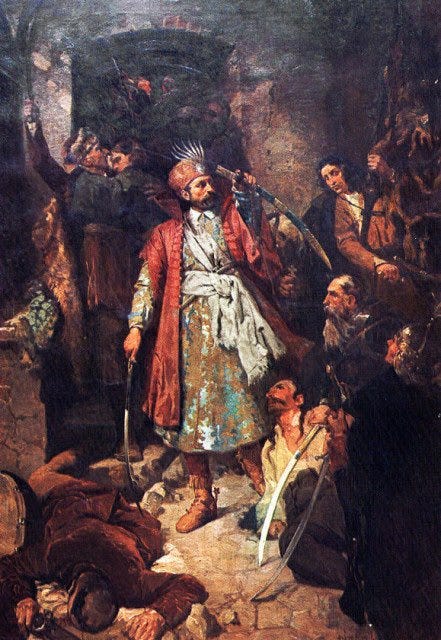
Thus on the morning of September 7th, the final assault begins. The Turks unleash the full fury of their arms: Greek fire, cannons, arrows, and small arms continue to grind down the crumbling citadel walls. The Turkic war drums beat loudly, and their war cries once again deafen the defenders. With a fusillade of Croatian artillery to clear their path, the gates of Szigetvár open, and Zrínyi leads the final glorious charge of his knights. Like Leonidas and his surviving Spartan warriors at Thermopylae, the Turks are unwilling to engage in hand to hand combat against these fearsomely dogged Christian knights. Ottoman infantry flee before the cavalry charge; Janissary sharpshooters then cut down the viceroy and his men in a hail of precise gunfire, their blood forever staining the soil of their homeland.
Sziget’s defenders have finally perished after their long and heroic last stand. Their bodies are defiled and mutilated while the Turks rush in to claim their bloody bounty. Zrínyi however has left one last wicked surprise for his lifelong foes. Over 3,000 pounds of gunpowder was booby trapped with a delayed fuse, lit right before the viceroy and his knights sallied forth from the citadel. As the Turks loot the castle and butcher the remaining servants, the gunpowder battery combusts in a spectacular explosion. The castle implodes in on itself and thousands of Turks are instantly killed in the gargantuan blast; one last dagger thrust into the heart of the Ottoman army.
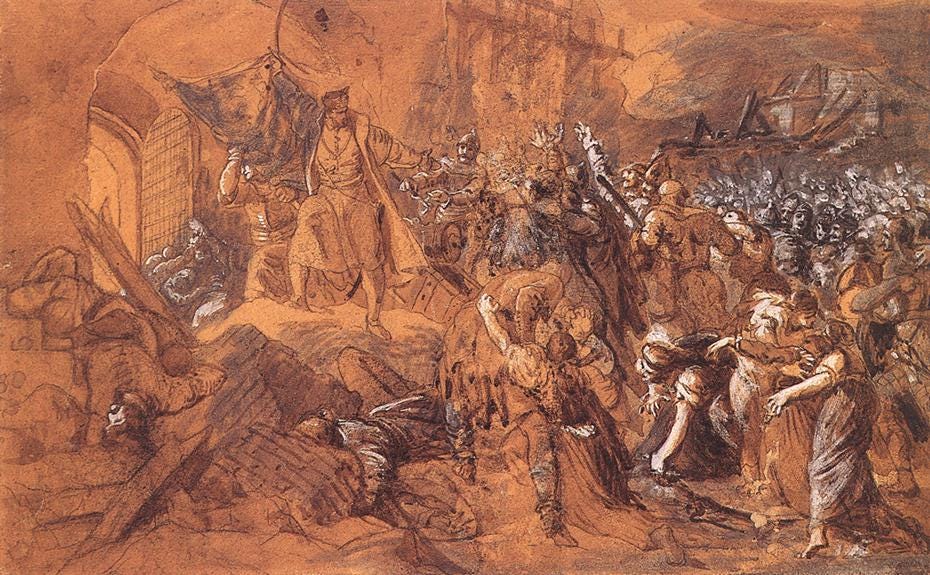

Despite being outnumbered at least 40 to 1, Szigetvár’s defenders held off the might of the Turkish army for over a month. Zrínyi and his garrison were killed to a man, nearly 3,000 in total; the Ottoman forces suffered even more catastrophic losses, numbering anywhere from 20,000 to 35,000 dead. While the battle was a pyrrhic Ottoman victory, Zrínyi and his men held on long enough to stop the Islamic invasion in its tracks. The extended siege meant that the colder winter weather had begun to creep in, and with the death of Suleiman and winter soon on its way, the Turkish invasion ground to a halt. The Hapsburg and the Ottoman Empires negotiated a peace treaty in 1568 at Adrianople that would bring 25 years of peace to these warring nations: long enough for a new generation of Zrinskis to grow and defend their homeland from ever present Islamic depredations.
— ‘U Boj, u boj!’ from the opera, Nikola Šubic Zrinski, based on the Siege of Szigetvár.
Last stands — crucibles of the body and soul — allow us to gaze into the heart of a warrior. It is easy for the armchair general to speak of chivalry and fights to the death in the abstract, when Death’s hand is yet afar. It is only when the bullets are flying, when the prospect of a fight to their final breath is imminent, that we learn the true caliber of a man. Last stands provide a stark look into the true character of a warrior, and they provide invaluable — if melancholic — lessons on martial courage in the face of unwinnable odds.
What makes a man fight on when no hope is left?
What turns him into a lion when cornered, selling his life dearly, all so that his brothers may yet live?
What spurs a man onward, knowing death is certain; knowing his doom lays before him, and yet, he rides out all the same?
For Viceroy Miklós IV Zrínyi and his courageous 3,000 martyrs of Sziget, it was love.
Love of Christ.
Love of family.
Love of country.
“Greater love hath no man than this, that a man lay down his LIFE for his friends.”
— The Gospel of John 15:13 KJV
Further Research
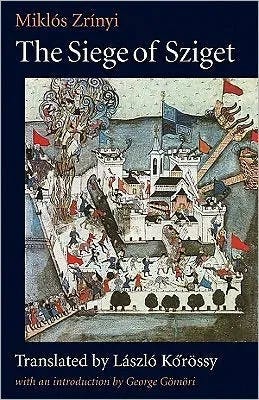
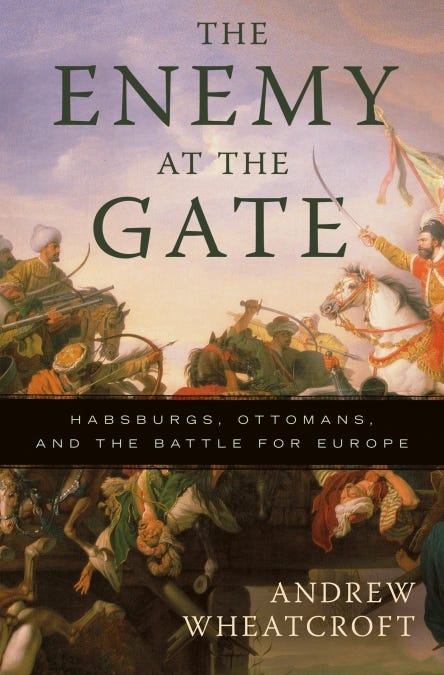

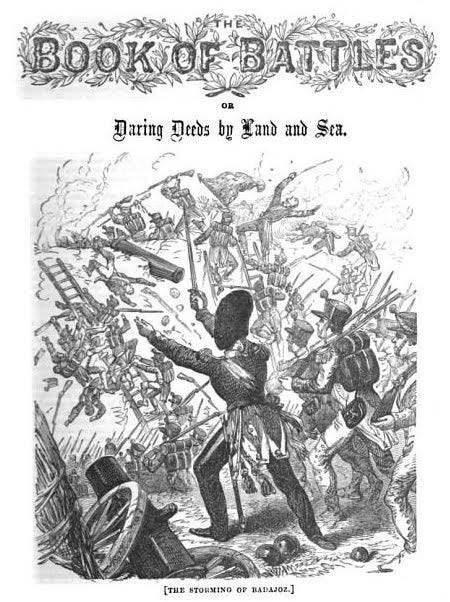


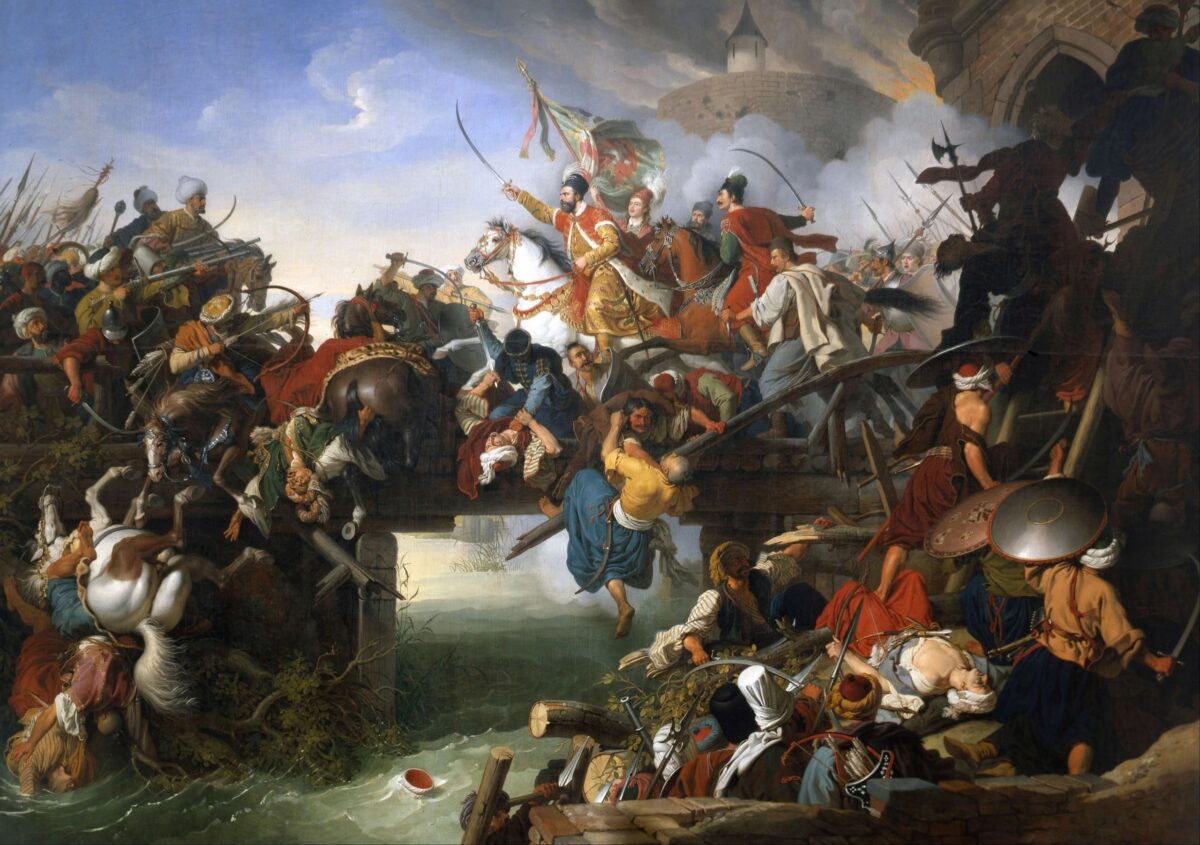
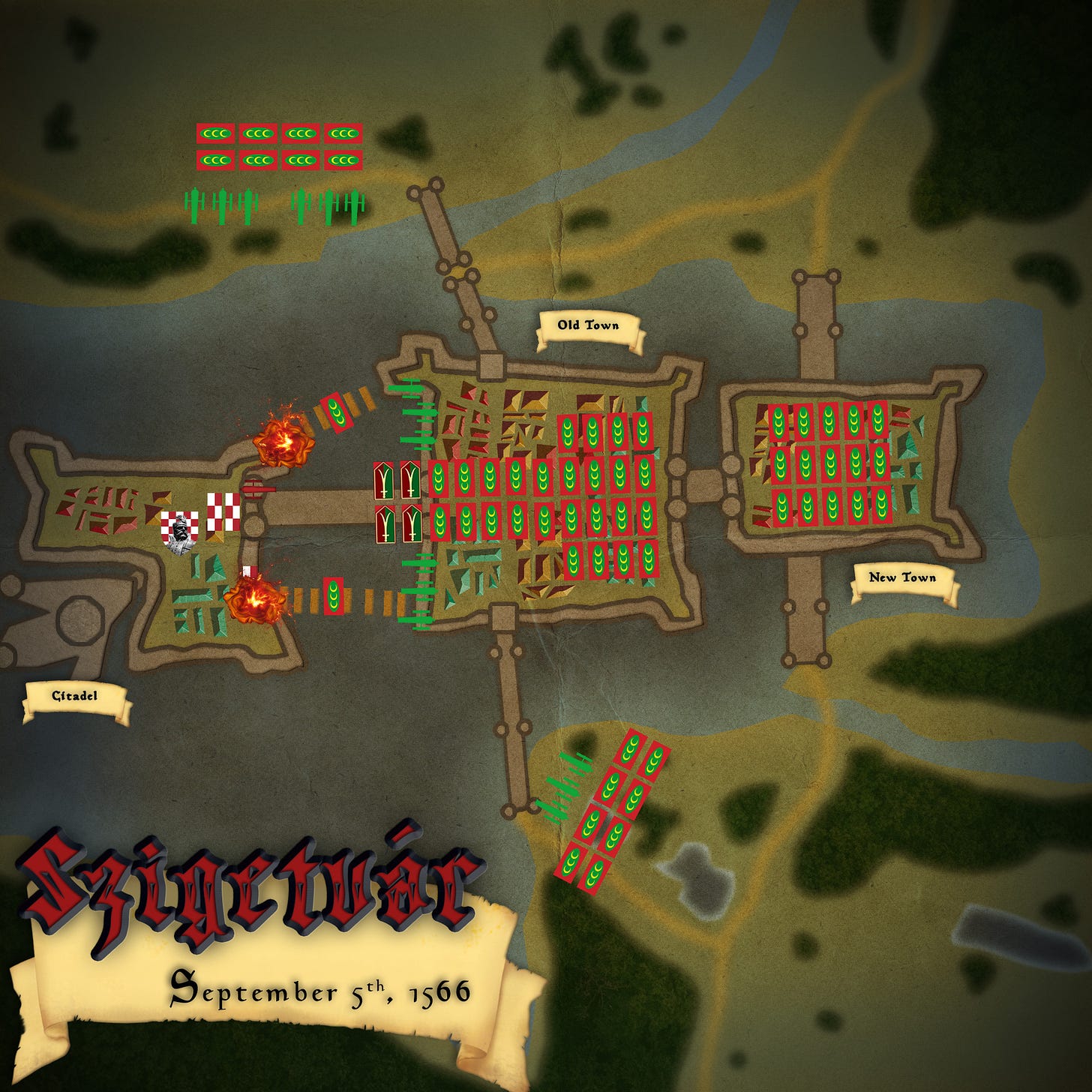




Heroic Christian soldiers, an example to us all.
Charles “The Hammer” Martel is made of the same stuff.
And so was Nathan Bedford Forrest and George Patton.
Men of honor know no nationality, but they know God.
Today’s Earthly enemy of Christians Are weasels, men behind the curtain.
They will have their hour, for it is written. Seven years is their hour. And who knows how many slimy years leading up to that hour.
Ain’t afraid of them. Ain’t afraid of their guillotine.
They are to be pitied until it’s too late for them.
Having read this makes me realize that this event contributes to the ethos from which Orban operates to resist EU insanity.
Magnificent!
Simply Magnificent!
I appreciate the kind words mark. All I ask is you spread it around to those who need to hear it.
Amen Amen. Some interesting lessons here, a battle I was not aware of.
I am Croatian by birth, and while I have lived the majority of my life in the USA, the spirit of Zrinski was in every soldiers heart during the recent war of independence for Croatia, in the early 1990’s. The Zrinski Opera was an inspiration for all Croatians, and U Boj, U Boj was a rallying call to again defend the new homeland, newly free from Communist Yugoslavia.
Thank You for sharing this important story that so few people know of – Bog i Harvati!
Hvala brate!
I only recently learned of Zrínyi and his epic struggle with Suleiman after reading Michael Walsh’s book, Last Stands, and it has really stuck with me. This battle is criminally underappreciated, it deserves way more recognition by military historians. Your people’s story has inspired me; the martyrs of Sziget are an enduring model of Christian chivalry and patriotic fervor that we would do well to learn from.
Ivan, I have written here before about beautiful Croatia; I was there in the mid-’90’s. The people were partying every day. They were so glad to be free once again.
I just remember all the DJ’s in Zagreb, in all the discos, played “Rock and Roll is King” by ELO, and everybody went nuts. Out of all songs. Even Jeff Lynne has no idea why.
Živjela Hrvatska!
Sorry guys but my wife, a real raised in Croatia Croatian, caught an error in my standard Croatian ending/pozdrav/gretting. It should be Bog i Hrvati, and not Bog i Harvati, as that would mean God and a soft cheese, rather than the classic pozdrav – God & Croatians!
grunge vet,
thanks 4 posting this,it is inspiring —
it reminds me of the article stucky posted several years ago about the battle between a roman legion & an army of barbarians? —
so much great history is forgotten & lost —
I honestly shed a single tear for Zrínyi and his men after reading this story. I pray my death (wherever it happens) is half as noble as theirs, and that it not come from assassination in the streets, being hit by a car, or eaten by wild animals or something silly like that.
I’d have killed myself a while ago, but I’m stuck with really important shit to do, and I don’t even want to do it. If someone else could, I’d let them do it, and finally end this suffering. Unfortunately, that isnt an option. There are millions of good people and children depending on this, and none of them even know it yet.
Hopefully this is all the renown I ever achieve. When I finally rest, I want to be at peace- unknown to immensely powerful and hateful enemies. Forgotten and unmissed by friends and loved ones. My resting place as much a mystery as Genghis Khan’s. Let the next one not suffer as much. I couldve died a dozen times over in really stupid ways. You’re quite lucky. I’m just not here on my own behalf anymore.
Good day.
Secret King is a demonic inspired self-delusion. Seek spiritual guidance .
Matthew 16:26
26 For what profit is it to a man if he gains the whole world, and loses his own soul? Or what will a man give in exchange for his soul?
Youre fuckin retarded
Please tell which part of the world you’re from, so I know where to steer clear of such smug idiocy.
If I had to guess, I’d say you’re from indiana or some shit. Maybe georgia. Actually it dont fuckin matter. I know youre not from where I’m headed. Fuck your rabbi religion pussy
I was unfamiliar with this.
I am thankful for your generosity in sharing freely.
May this embolden more of us to
“buck up”.
May the Most Righteous and Just G-d be with us.
Knowledge is power brother, all I ask is you keep spreading the message.
God bless.
Amen and amen
I have lived long enough already, seen evil and good,
And have now tired of meaninglessness:
For I have seen always, what the world gives
With one hand, with two it immediately jerks back.
The Great and Enduring Heresy of Mohammed
Hilaire Belloc
“Millions of modern people of the white civilization—that is, the civilization of Europe and America—have forgotten all about Islam. They have never come in contact with it. They take for granted that it is decaying, and that, anyway, it is just a foreign religion which will not concern them. It is, as a fact, the most formidable and persistent enemy which our civilization has had, and may at any moment become as large a menace in the future as it has been in the past.
There is another point in connection with this power of Islam: Islam is apparently unconvertible. The missionary efforts made by great Catholic orders which have been occupied in trying to turn Mohammedans into Christians for nearly 400 years have everywhere wholly failed. We have in some places driven the Mohammedan master out and freed his Christian subjects from Mohammedan control, but we have had hardly any effect in converting individual Mohammedans.
It has always seemed to me possible, and even probable, that there would be a resurrection of Islam and that our sons or our grandsons would see the renewal of that tremendous struggle between the Christian culture and what has been for more than a thousand years its greatest opponent.
Why this conviction should have arisen in the minds of certain observers and travelers, such as myself, I will now consider. It is indeed a vital question: “May not Islam arise again?””
“The Messiah of Israel will only come when Christ, Europe, Christianity are totally defeated. Therefore I ask you, is this good news that Islam is invading Europe? Yes, this is great news!” Rav David Touitou